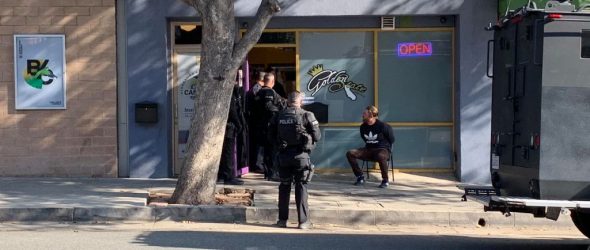After struggling for years, Pasadena officials say they’ve shuttered the city’s last-standing unlicensed cannabis dispensary, marking a capstone on an eight-year push.
Although the endeavor began in 2012, progress was not slow and steady. It was just slow — until August 2018. That’s when the city’s tedious, expensive and ineffective process — often hamstrung by uncoordinated efforts — was transformed into an aggressive and ruthlessly efficient multidepartment force, city officials said.
For those first six years, Pasadena spent more than $1 million to close nine storefronts, Chief Assistant City Prosecutor Michael Dowd said in an interview. It was hardly the proverbial drop in the bucket.
As officials moved to close shop down, another would pop up, forcing authorities into a game of marijuana whack-a-mole. At its peak, at least 28 unlicensed dispensaries were operating simultaneously within city limits, Dowd said.
It’s not like the shops have stopped popping up today. The last one, Kush 20 House, to close had only opened three months ago, Dowd said. He expects illegal operators to continue to open shop, but the difference now is the city’s new strategy to quickly close them down.
Since August 2018, the city spent less than $200,000 to close 25 dispensaries, he said. That means the price of closing a single illegal dispensary dropped from more than $111,000 to less than $8,000. Dowd credited the success to a coordinated effort across several city departments.
Instead of the city’s zoning enforcement officials chasing down some dispensaries while the City Attorney’s Office pursued others, both departments coordinated with one another and law enforcement to move simultaneously against offenders.
“Where before we only used one or two tools, now we use the entire arsenal against them,” Dowd said.
Dowd was part of the coordinated effort, now known as the Pasadena Marijuana Dispensary Suppression Detail, and one of the first tests of the system involved a particularly stubborn unlicensed dispensary, Rose Buds, on 1291 E. Walnut St.
The store landed on officials’ radar in September 2017, according to a civil lawsuit the city later filed.
Pasadena’s Code Compliance Manager Jon Pollard persuaded the property owner to try evicting the tenants, but the dispensary owners simply ignored the unlawful detainer. Soon after, Pollard hand-delivered to the shop a cease-and-desist letter, which also went ignored.
Pollard returned five times over the next four months, issuing more than $1,000 in fines and ordering the store’s closure. In February 2018, the city’s Code Enforcement Commission held a hearing where it too ordered Rose Buds shuttered to no avail; the dispensary’s owner, Tai Tan Nguyen didn’t even show up to the hearing, the suit says.
Nguyen could not be reached for comment for this story.
The city would file its civil lawsuit against Nguyen and his associates in May 2018, asking a judge to close the business, but after a few months, it became clear “the case wasn’t really going anywhere,” Dowd said.
The city shifted to its new strategy: Officials went in with an inspection warrant, documenting who was working there and identifying the store’s management and its owners. They kept watching the premises and issuing fines; eventually the store and its associates racked up more than $20,000 in penalties, Dowd said.
Law enforcement later raided the property with a search warrant in hand and arrested everyone on site, he said. The store was closed shortly thereafter and court records indicate that Nguyen alongside five of his associates, including a co-owner, were charged in December 2018.
Five months later, the city inked deals deals with guilty pleas from everyone involved. Nguyen and his co-owner were sentenced to three years of probation and ordered to pay the $20,000 in city fines, as well as court fees. Alongside his employees, he was also given a $100 fine and nine hours of community service.
The 25 dispensaries closed since August 2018 have translated into charges against 89 people, Dowd said. Of those, 50 have pleaded guilty to violating the city’s zoning or cannabis laws, he said. Trials are still pending for the remaining 39 individuals.
The city hasn’t lost a single case yet, he added.
Nearly all of the cases followed the same trajectory as Nguyen’s: It starts with eviction notices from the property owner, then a cease-and-desist, then citations and fines. Under the old system, the city would typically file a civil lawsuit at this point, and it would painstakingly snake its way through the courts.
Under the the new system, officials are apt to keep pressing the businesses with warrants for inspection and searches, then arrests and criminal charges. If the owners still don’t want to shut down after taking a guilty plea, city authorities can get an abatement warrant, which allows them to destroy all of the merchandise and board the facility, Dowd said. They’ve used that particular tool four times now.
Curiously to Dowd, he said many of the people associated with these businesses had been telling the community and officials they were law abiding, tax-paying businesses. The only laws they were breaking were Pasadena’s zoning codes, they would say, but it simply wasn’t true.
Of the 34 dispensaries Pasadena has shutdown since 2012, “not one of them had a state license to operate. Not one was paying any taxes,” Dowd said. They weren’t paying state or city fees, either.
“These would not be lawful businesses, even if they were selling something else,” Dowd said.


